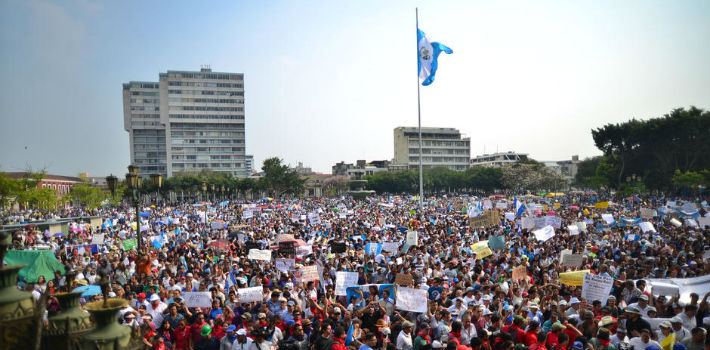
EspañolOn September 6, if everything goes as planned, Guatemalans will choose a new president. Three months ago, the outcome of the race seemed to be a foregone conclusion. Since then, a corruption scandal has altered the entire political scene: the vice president resigned, the ruling-party candidate dropped out, and several congressmen and mayors became the target of accusations.
Guatemalans appear to have awakened from their apathy, and are now committed to condemning corruption out of a sense of civic duty not seen in decades.
In April, Manuel Baldizón, the 2011 presidential election runner-up, led the polls with 43 percent. The Renewed Democratic Liberty Party (LIDER) leader launched an expensive populist campaign, handing out money to the poor and making impossible promises.
True to his arrogant style that ignores any ethical concern whatsoever, Baldizón — who plagiarized his thesis to obtain a PhD — proclaimed himself to be Guatemala’s next head of state.
That all changed when Guatemalans took to the streets to call for an end to politics as usual. A strong social-media campaign emerged in opposition to his openly populist platform, and the widespread condemnation forced Baldizón to go on the defensive. The LIDER candidate even suspended the marches he had planned across the country, and is now registering below 25 percent in the polls.
Another strong contender, Sandra Torres, the ex-wife of former president Álvaro Colom, is also a populist, though is less vocal about it than Baldizón. Torres divorced Colom and unsuccessfully ran for president in the last election. She now aims to expand the politics of gifts and handouts that she implemented during her time as First Lady. However, her popularity has suffered as well.
It a last ditch attempt to stay in the race, the ruling Patriotic Party (PP) selected a new candidate, the well-known journalist Mario David García. However, García has been unable to convince the electorate that the PP is anything more than a corruption network for personal gain. His confusing and contradictory messages, coupled with widespread suspicion that he was bribed into accepting the PP nomination, have not helped his cause either.
Apart from these three prominent yet discredited alternatives, there are 11 other candidates competing to win over Guatemalan citizens who are fed up with corruption and populism.
One of them is Jimmy Morales, a man without a clear ideology, who has emerged as a new political player. Morales is a comedian, and while he lacks a solid political record, he cannot be dismissed as a contender. Guatemalan society is currently so averse to traditional politics that Morales could be favored for being an outsider.
Roberto “Canela” González is a serious contender, and currently appears to be the favorite among supporters of responsible government, spending cuts, increased security, and free-market economics. Canela offers a coherent message that sets him apart from demagogic politicians.
Zury Ríos is another candidate who could end up winning over Guatemalans who are opposed to the populist ideas espoused by most parties. Ríos is the daughter of former President Efraín Ríos Montt and has had problems registering as a candidate, despite the backing of supporters who highlight the clarity of her message and her academic record.
Although the presidential race has largely ignored economic issues so far, these three candidates, who seek to distance themselves from past administrations, have an incentive to respect and expand free-market policies.
The results of the election are far from clear at this point, and the ongoing corruption investigations will likely sway the public in one direction or another. What is certain, however, is that the next president, whoever he or she may be, will have to tread carefully. Guatemalans won’t put up with politicians shamelessly squandering their money anymore.
 Versión Español
Versión Español












